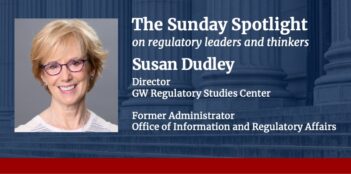
Empirical research reveals stronger benefit-cost analysis during less political rulemakings.
Why do some regulations deliver greater value to society than others? We can start to answer this important question by drawing on data from the benefit-cost analyses that agencies have been required to conduct for their significant regulations for more than 30 years. For the past 15 years, the Office of Information and Regulatory Affairs (OIRA) has provided these data in an annual report to Congress, generating a wealth of information about regulations and their expected impacts. These data lead to a stark conclusion: regulations that are issued away from the glare of the political spotlight tend to have higher net benefits (that is, benefits minus costs) than do politically salient regulations.
Disappointingly to us—as both former OIRA employees and supporters of benefit-cost analysis—agencies do not appear to make better decisions, at least from an economic perspective, when they perform more extensive benefit-cost analyses. We analyzed ten years of data for 109 rules, and found no relationship between the amount of information considered in the agency’s benefit-cost analysis and the net benefits in the rule.
When we assessed the impact of political factors on the economic results of the rules, however, we found a surprising relationship. We divided our dataset both by the comments received on the rule, assuming that rules receiving more comments were more political, and by whether the rule was a “midnight” regulation (that is, promulgated in the last six months of an administration), assuming that rules promulgated at the end of an administration tend to be more controversial.
Our findings were stark. Rules that were issued out of the political spotlight had higher net benefits than other rules. The contrast was sharpest when the number of comments and timing variables were combined. As we note in a recent paper in the peer-reviewed journal Regulation & Governance, “[o]f the 25 rules that both received below the median number of comments, and were not midnight regulations, 17 had higher than the median amount of net benefits…By contrast, 30 out of 44 rules that were either midnight regulations or had a greater than the median number of comments had below the median net benefits.”
One of our other findings further highlights the interaction between politics and estimates of regulatory performance. While we found no significant relationship between the information provided in an analysis and the net benefits, there was one exception. Those rules with net benefits between $0 and $100 million were supported by analyses that provided less information than rules with higher net benefits or net costs. In other words, agencies may have felt pressure to produce analyses that showed net benefits—and therefore cut corners on their analytical rigor while doing so.
Debates over benefit-cost analysis tend to focus either on the morality of the entire enterprise or on specific aspects of the analysis, such as the correct discount rate to use or the treatment of uncertainty. While these debates are worthwhile, they ignore a central reality about benefit-cost analysis: it is conducted in a political context. As both the House and Senate consider regulatory reform bills and as states across the U.S. and countries around the world consider adding analytical requirements, academic and policy observers would be well served to keep this reality in mind. Just as politics influence the legislative process that directs agency action, so too do politics influence agencies’ policy choices—and their resulting benefit-cost analyses. In practical terms, we believe this conclusion requires making the process for generating and reviewing analyses as transparent as possible while insulating BCA from politics as much as is legally feasible.
This post draws from the authors’ recent article in Regulation & Governance, “The Triumph of Regulatory Politics: Benefit–Cost Analysis and Political Salience,” published online on March 19, 2012.




